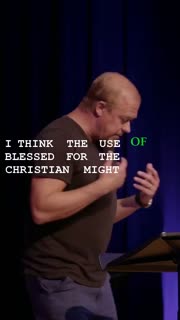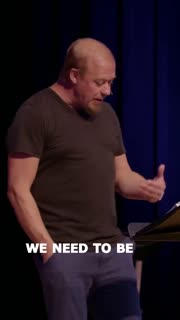True Blessedness: The Power of Forgiveness
Devotional
Sermon Summary
Bible Study Guide
Sermon Clips
### Quotes for Outreach
1. "We are truly blessed when we walk as forgiven. So that means true blessing is being forgiven. And here's what that, that doesn't mean. It means that, well, being blessed according to the eyes of God is not found in the amount of material things that you possess. Or being blessed is not recognized in just how well we can perform or how good of a person we might think we are. True blessedness is forgiveness of sins, which God then allows to, to offer, to give peace with God." [10:20] (36 seconds)
2. "The gospel declares that it's Christ's righteousness on our behalf. It's Christ, his perfect standing that's gifted to us, that the relationship has been secured because of Christ's offer of forgiveness, of cleansing. And so if you're someone like myself who finds yourself at times in this Christian karma space, listen, I totally get it." [22:53] (28 seconds)
3. "We are truly blessed when we walk as forgiven. Because here's the reality. Paul talks about it this way. No sin is fully hidden. He says this in Corinthians. God will bring light. What is hidden in darkness will expose the motives of man's heart. Here's what happens when we remain silent. David talks about this in his psalm here. What happens is that our strength, our strength becomes dried up." [32:11] (28 seconds)
4. "We are blessed because he forgives. We're truly blessed when we walk as forgiven. And we're blessed when we turn from sin and we turn to him as our refuge. Here, here's verse eight. It says this, David, he's turned in the corner to, really to shepherd mode. He's, he's moving towards the end of this psalm." [45:06] (17 seconds)
5. "We are truly blessed when we walk as forgiven. And we are forgiven when we confess and we repent of our sin. Well, let's keep rolling with this psalm. Verse six, it says, So when you, when you see it, therefore, you know, it kind of gives you an action. It's a call to action. And what's this call that we have here? Well, it's for believers, right? Everyone who, who is godly, that we join together to pray, to pray, right?" [40:55] (31 seconds)
### Quotes for Members
1. "I think the use of blessed for the Christian might just, it might just be need to use it with a little bit of sensitivity, right? A little bit of sensitivity and sharing that with my own, um, heart. Cause, cause in fact the Lord has been convicting me of, uh, like analyzing of what I perceive as, as a blessing." [07:28] (19 seconds)
2. "We need to be the children of God who walk in confession, walk in repentance. It reminds me of the parable that God said, what Jesus tells in, in, in Luke, his gospel, Luke 18. It says this. He also told this parable to some who trusted in themselves that they were righteous and treated others with contempt. Two men went up in the temple to pray. One a Pharisee, the other a tax collector." [34:56] (21 seconds)
3. "And so what that means is recognition of that we need to have a Christ-like community in our lives. We need to have a biblical community. And so we see there's confessing through this communing, right, with God, and there's confessing in community with others. And now listen, I'll be super honest, that's not an easy task. Not many of us enjoy confessing when we're wrong, right? None of us really enjoy that painful process, but the reality is for the follower of Jesus, it's necessary." [37:48] (31 seconds)
4. "And so the hope is that if we can exist from that space, from leadership, that that posture, that welcomes repentance and confession and healing, pointing the blessedness of forgiveness, that that will be part of the culture that we have here. That'll see that in all of the ministries, all the connections here at Commonplace Church. That's a hope. We don't have to walk around like secrecy, where we can just truly offer the truth of the gospel for all those who call upon the name of Jesus." [39:21] (33 seconds)
5. "And so my concern, though, for the church and any church that doesn't allow for a space for transparency, for openness, for vulnerability is that, or even if we don't have this in our personal environments that lack openness, the concern is that, well, sin not being shared or failures not being shared, well, what happens is we just become silent about them. We're just devoid of conversations about them. And the concern, and David points this out, is silence becomes this like internal violence." [25:43] (34 seconds)
Ask a question about this sermon
1. "We are truly blessed when we walk as forgiven. So that means true blessing is being forgiven. And here's what that, that doesn't mean. It means that, well, being blessed according to the eyes of God is not found in the amount of material things that you possess. Or being blessed is not recognized in just how well we can perform or how good of a person we might think we are. True blessedness is forgiveness of sins, which God then allows to, to offer, to give peace with God." [10:20] (36 seconds)
2. "The gospel declares that it's Christ's righteousness on our behalf. It's Christ, his perfect standing that's gifted to us, that the relationship has been secured because of Christ's offer of forgiveness, of cleansing. And so if you're someone like myself who finds yourself at times in this Christian karma space, listen, I totally get it." [22:53] (28 seconds)
3. "We are truly blessed when we walk as forgiven. Because here's the reality. Paul talks about it this way. No sin is fully hidden. He says this in Corinthians. God will bring light. What is hidden in darkness will expose the motives of man's heart. Here's what happens when we remain silent. David talks about this in his psalm here. What happens is that our strength, our strength becomes dried up." [32:11] (28 seconds)
4. "We are blessed because he forgives. We're truly blessed when we walk as forgiven. And we're blessed when we turn from sin and we turn to him as our refuge. Here, here's verse eight. It says this, David, he's turned in the corner to, really to shepherd mode. He's, he's moving towards the end of this psalm." [45:06] (17 seconds)
5. "We are truly blessed when we walk as forgiven. And we are forgiven when we confess and we repent of our sin. Well, let's keep rolling with this psalm. Verse six, it says, So when you, when you see it, therefore, you know, it kind of gives you an action. It's a call to action. And what's this call that we have here? Well, it's for believers, right? Everyone who, who is godly, that we join together to pray, to pray, right?" [40:55] (31 seconds)
### Quotes for Members
1. "I think the use of blessed for the Christian might just, it might just be need to use it with a little bit of sensitivity, right? A little bit of sensitivity and sharing that with my own, um, heart. Cause, cause in fact the Lord has been convicting me of, uh, like analyzing of what I perceive as, as a blessing." [07:28] (19 seconds)
2. "We need to be the children of God who walk in confession, walk in repentance. It reminds me of the parable that God said, what Jesus tells in, in, in Luke, his gospel, Luke 18. It says this. He also told this parable to some who trusted in themselves that they were righteous and treated others with contempt. Two men went up in the temple to pray. One a Pharisee, the other a tax collector." [34:56] (21 seconds)
3. "And so what that means is recognition of that we need to have a Christ-like community in our lives. We need to have a biblical community. And so we see there's confessing through this communing, right, with God, and there's confessing in community with others. And now listen, I'll be super honest, that's not an easy task. Not many of us enjoy confessing when we're wrong, right? None of us really enjoy that painful process, but the reality is for the follower of Jesus, it's necessary." [37:48] (31 seconds)
4. "And so the hope is that if we can exist from that space, from leadership, that that posture, that welcomes repentance and confession and healing, pointing the blessedness of forgiveness, that that will be part of the culture that we have here. That'll see that in all of the ministries, all the connections here at Commonplace Church. That's a hope. We don't have to walk around like secrecy, where we can just truly offer the truth of the gospel for all those who call upon the name of Jesus." [39:21] (33 seconds)
5. "And so my concern, though, for the church and any church that doesn't allow for a space for transparency, for openness, for vulnerability is that, or even if we don't have this in our personal environments that lack openness, the concern is that, well, sin not being shared or failures not being shared, well, what happens is we just become silent about them. We're just devoid of conversations about them. And the concern, and David points this out, is silence becomes this like internal violence." [25:43] (34 seconds)










